| Listing 1 - 10 of 496 | << page >> |
Sort by
|
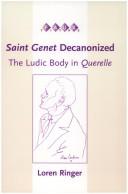
ISBN: 9042015861 9004485708 9789042015869 9789004485709 Year: 2001 Volume: 214 Publisher: Leiden;Boston BRILL
Abstract | Keywords | Export | Availability | Bookmark
 Loading...
Loading...Choose an application
- Reference Manager
- EndNote
- RefWorks (Direct export to RefWorks)
2002 will mark the 50th anniversary of the publication of Saint Genet . Ever since that date, Jean Genet's work has largely been read and interpreted through Sartre's analysis of the author. In this study, the author seeks to liberate Genet's fiction from the philosopher's stranglehold and reopen the work to new venues of interpretation. After challenging the accuracy and pertinence of Sartre's project and describing the problematic influence it has had, the author begins his own investigation of Genet by examining the notion of precarious identity which informs the Genetian text. Through a dense weft of textual maneuvers arises an aesthetically playful approach to sexual identity. From the beginnings of work in the field of sexology, homosexual desire has defied certain types of rigid schematization such as Freud's Oedipus complex. Indeed, it can be better viewed through the alternative interpretive lenses of Deleuze and Guattari who challenge patriarchal order in the study of sexuality. Such an approach eventually leads to a discovery of the body's centrality in Genet's fiction, especially in his last novel Querelle . It is precisely this ludic body that has escaped Sartre's critical eye and many subsequent studies of Genet's literature.
Book
ISBN: 9780415385985 0415385989 9781003060611 1003060617 9781000134056 1000134059 9781000116106 1000116107 9781000155372 1000155374 9780415634205 0415634202 Year: 2010 Publisher: New York, N.Y. Routledge
Abstract | Keywords | Export | Availability | Bookmark
 Loading...
Loading...Choose an application
- Reference Manager
- EndNote
- RefWorks (Direct export to RefWorks)
Beckett, Samuel --- Human body in literature. --- Beckett, Samuel, --- Dramatic works.
Book
ISBN: 3884793322 Year: 1987 Publisher: Würzburg Königshausen und Neumann
Abstract | Keywords | Export | Availability | Bookmark
 Loading...
Loading...Choose an application
- Reference Manager
- EndNote
- RefWorks (Direct export to RefWorks)
Nietzsche, Friedrich W. --- Human body (Philosophy) --- History --- Nietzsche, Friedrich
Book
ISBN: 9781845401535 1845401530 Year: 2009 Publisher: Charlottesville, Va Imprint Academic
Abstract | Keywords | Export | Availability | Bookmark
 Loading...
Loading...Choose an application
- Reference Manager
- EndNote
- RefWorks (Direct export to RefWorks)
Philosophical anthropology --- Human body (Philosophy) --- Body, Human (Philosophy) --- Philosophy
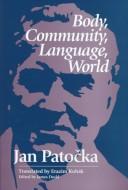
ISBN: 9780812693591 9780812693584 0812693590 Year: 1998 Publisher: Chicago, Ill. Open Court
Abstract | Keywords | Export | Availability | Bookmark
 Loading...
Loading...Choose an application
- Reference Manager
- EndNote
- RefWorks (Direct export to RefWorks)
Philosophical anthropology --- Theory of knowledge --- Phenomenology --- Human body (Philosophy)
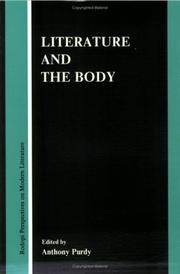
ISBN: 9004656413 905183389X Year: 1992 Publisher: Amsterdam Rodopi
Abstract | Keywords | Export | Availability | Bookmark
 Loading...
Loading...Choose an application
- Reference Manager
- EndNote
- RefWorks (Direct export to RefWorks)
Human body in literature. --- Literature --- History and criticism. --- Comparative literature
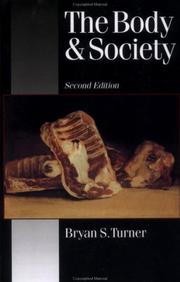
ISBN: 0803988095 0803988087 9780803988095 Year: 1996 Publisher: London: Sage,
Abstract | Keywords | Export | Availability | Bookmark
 Loading...
Loading...Choose an application
- Reference Manager
- EndNote
- RefWorks (Direct export to RefWorks)
Sociology of culture --- Body, Human --- Social aspects. --- Human body --- Corps humain --- Social aspects --- Aspect social --- Human body - Social aspects
Book
ISSN: 16174399 ISBN: 9783787329281 9783787329298 3787329285 3787329293 Year: 2016 Volume: 13 Publisher: Hamburg: Felix Meiner,
Abstract | Keywords | Export | Availability | Bookmark
 Loading...
Loading...Choose an application
- Reference Manager
- EndNote
- RefWorks (Direct export to RefWorks)
Nicht erst die moderne Philosophie hat die fundamentale Doppelnatur des Körperlichen erkannt, das einerseits diejenigen Gegenstände auszeichnet, die wir mit größtmöglicher Distanz und Objektivität wissenschaftlich untersuchen, das sich uns andererseits und zuallererst aber auch in der Form des jeweils eigenen, in seiner Integrität stets bedrohten und letztlich dem Zerfall ausgelieferten Körpers aufdrängt als Bedingung, an der unsere eigene Existenz durch und durch hängt. Schon die Denker der Antike arbeiten sich an dieser Problematik ab; und es gilt, die gedanklichen Ressourcen nutzbar zu machen, die sie für uns bereithalten. Die in diesem Band versammelten Beiträge spiegeln die antike Auseinandersetzung um den Körper und das Körperliche in all ihren Dimensionen und Schattierungen wieder. Gleichzeitig machen sie deutlich, dass diese Auseinandersetzungen nur geführt werden konnten vor dem Hintergrund einer althergebrachten und für lange Zeit sehr wirkmächtigen Tendenz, Organismen wie die Menschen als paradigmatische körperliche Wesen aufzufassen und dieses Paradigma zum Ausgangspunkt für Reflexionen über das Körperliche als solches zu nehmen. Im ersten Teil des Bandes geht es um das antike Nachdenken über den lebendigen, insbesondere menschlichen Körper. Im Mittelpunkt steht weniger die wissenschaftliche Beschäftigung mit diesem Körper als vielmehr die existenzielle Situation, in der sich der Mensch als ein körperliches Wesen befindet. Der zweite und dritte Teil behandeln die Frage nach den Möglichkeiten, Bedingungen und Grenzen der wissenschaftlichen Beschreibung von Körpern und ihrem Verhalten bei Platon und in der platonischen Tradition sowie bei Aristoteles und in der aristotelischen Tradition.
Ancient history --- History of philosophy --- Philosophy and psychology of culture --- Literature --- Human body (Philosophy) --- Corps humain (Philosophie) --- Congresses. --- Congrès --- HELLAS -- 14 --- Congrès --- Philosophy, Ancient --- Human body --- Human body in literature --- History --- Aristotle --- Plato --- Congresses --- Human body (Philosophy) - Early works to 1800 - Congresses --- Philosophy, Ancient - Congresses. --- Human body - History - To 1500 - Congresses --- Human body in literature - Congresses --- Aristotle - Congresses --- Plato - Congresses
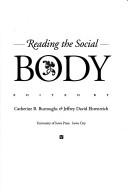
ISBN: 1587290294 9781587290299 0877454019 0877454027 9780877454014 9780877454021 Year: 1993 Publisher: Iowa : University of Iowa Press,
Abstract | Keywords | Export | Availability | Bookmark
 Loading...
Loading...Choose an application
- Reference Manager
- EndNote
- RefWorks (Direct export to RefWorks)
The overarching argument of Reading the Social Body is that the body is cultural rather than ""natural."" Some of the essays treat the social construction of bodies that have actually existed in human history; others discuss the representation of bodies in artistic contexts; all recognize that everything visible to the human body--from posture and costume to the width of an eyebrow or a smile--is determined by and shaped in response to a particular culture.
Feminist criticism. --- Human body -- Social aspects. --- Human body (Philosophy). --- Human body in literature. --- Human body --- Human body in literature --- Human body (Philosophy) --- Feminist criticism --- Manners & Customs --- Anthropology --- Social Sciences --- Criticism --- Body, Human (Philosophy) --- Philosophy --- Body, Human, in literature --- Human figure in literature --- Social aspects --- Thematology --- Literary semiotics --- Sociology of literature --- Social aspects.
Book
ISBN: 9783110196221 Year: 2008 Publisher: Berlin Mouton de Gruyter
Abstract | Keywords | Export | Availability | Bookmark
 Loading...
Loading...Choose an application
- Reference Manager
- EndNote
- RefWorks (Direct export to RefWorks)
Psycholinguistics --- Sociolinguistics --- Body, Human, and language. --- Human body and language. --- Language and culture. --- Human body and language --- Language and culture --- Culture and language --- Culture --- Body, Human, and language --- Language and the human body --- Language and languages
| Listing 1 - 10 of 496 | << page >> |
Sort by
|

 Search
Search Feedback
Feedback About UniCat
About UniCat  Help
Help News
News